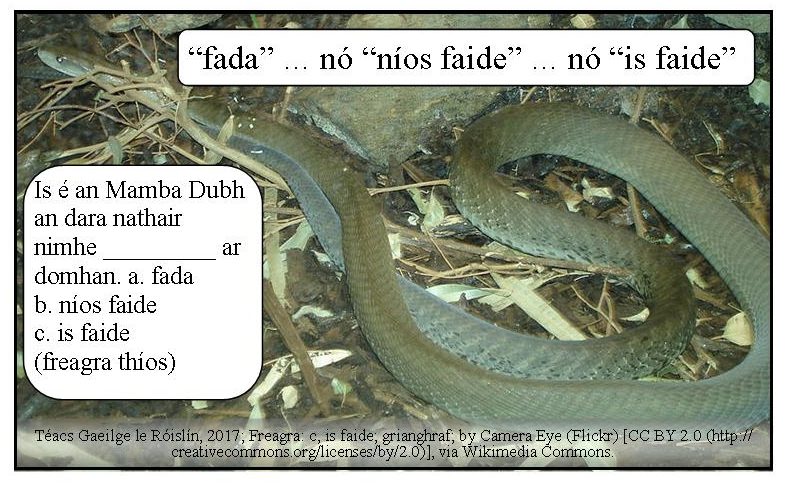Fada — Níos Faide — Is Faide and Fada/Fhada: Forms of the Word ‘Fada’ in Irish Posted by róislín on Jul 14, 2017 in Irish Language
(le Róislín)
Since our last blogpost looked at the length of an enchilada (fad enchilada), so we could practice saying “enchilada fada,” “enchilada an-fhada,” and “enchilada an-fhada ar fad,” I figured today we could practice the word “fada” a little more.
The forms you see in the graphic above are, respectively,
fada, long. as in “bóthar fada,” a long road (fhada if after a feminine singular noun, like “nathair fhada“, a long snake)
níos faide, longer, as in “Tá an nathair seo níos faide ná an nathair sin.” (This snake is longer than that snake).
is faide, longest, as in, “Seo í an ceann is faide” (This is the longest one). I used the pronoun “í” here, since I’m still loosely referring to “nathracha” (snakes), and that noun is grammatically feminine. If I said “Seo é an ceann is faide,” the original subject would have been a masculine noun, not a feminine one.
Did you get the answer for “Is é an Mamba Dubh an dara nathair nimhe __________ ar domhan” from the graphic above? The “freagra” is “thíos” and it was also in the credit line of the graphic.
BTW, you may have already noticed that “an ceann” normally means “head,” but remember, it can also be used to refer to a previously mentioned noun, whatever the earlier topic of discussion was in that particular context. Of course, if there were a competition among long-headed horses walking into bars, well, no, that wouldn’t really work, because the bartender says, “Why the long face?” not “Why the long head?” in that old chestnut. A good attempt at whimsy, though. Anything to break up the grammar component of the blog, since a bit of “an ghramadach” is coming up next!
Regarding the gender of the noun “Mamba” in the phrase “Mamba Dubh,” here’s what I’ve found so far (féach ar an nóta thíos chun nuashonrúchán a fháil, 7/29/17):
a)) no authoritative dictionary entries or online encyclopedia entries indicating gender
b)) one hit online for “mamba dubh,” suggesting masculine gender
c)) one hit online for “an mamba dhubh“ [sic], which is grammatically unclear, since “an mamba” would be masculine but “mamba dhubh” would be feminine
d)) when I wrote previously in this blog about mambas, I decided to go with masculine for the noun, since there seemed to be no conclusive evidence that it was feminine. I did poke around a bit online for gender decisions for other languages, and found the following:
baininscneach: Spáinnis, Gearmáinis (per an Vicípéid)
firinscneach: Fraincis, Iodáilis (per an Vicípéid)
So that wasn’t really conclusive. Not that other languages’ decisions for the gender of loan words would really have any bearing on the gender of a “focal iasachta” in Irish, but it would at least be interesting background information.
Tagann an focal “mamba” ón tSúlúis “imamba” agus níl a fhios agam as mo sheasamh an bhfuil inscne ghramadúil ag an teanga Súlúise nó nach bhfuil. (The word “mamba” comes from the Zulu “imamba” and I don’t know offhand if the Zulu language has grammatical gender or not). Also, offhand (as mo sheasamh), I can’t think of any non-Indo-European language that _does_ have grammatical gender, but I don’t know for sure. It would, of course, be interesting to know how the word “imamba” fits into a Zulu sentence, but that’ll have to be a rainy day project. Ach amháin má tá Súlúis ag duine ar bith ar an liosta seo.
Being a Star Trek fan, I really want to ask, “An bhfuil Súlúis ag Sulu?” but, of course, Uhura would be the more likely candidate for that situation, given that she knows “Svahaílis.” And on that note, I’ll say SGF and see you in some galaxy or other – Róislín
Freagra: Is é an Mamba Dubh an dara nathair nimhe is faide ar domhan.
Nóta faoi inscnea: faoi dheireadh fuair mé an frása seo: mamba glas oirthearach, Eastern green mamba. Deir sé linn go bhfuil an focal “mamba” firinscneach!

Build vocabulary, practice pronunciation, and more with Transparent Language Online. Available anytime, anywhere, on any device.





Leave a comment: